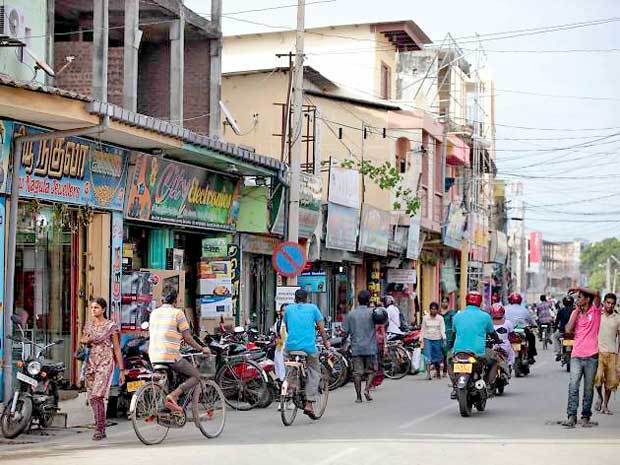Reply To:
Name - Reply Comment
Last Updated : 2024-04-20 00:00:00
 A Busy street in Jaffna
A Busy street in Jaffna
Everyday life in the post-war North moves from trouble to trouble, from debt to abuse to violence. Women bear the brunt of this crisis; their labour and time are exploited, their meagre earnings are siphoned off by loan sharks, they are expected to make ends meet for their families and their bodies are subject to control. Yet, there is no vision or leadership for social rejuvenation as both the Tamil leadership and the state ignore this reality.
Conditions of labour in the war-torn regions are worse compared to the rest of the country. Trade  unions have not functioned for decades, and workers’ rights are violated by employers and are not a public priority. The deteriorating conditions for workers affect women the most; when they are not organised, women workers are exploited along class and gender. Retail shops to sea food companies pay women workers a pittance – sometimes just four hundred rupees for a hard day’s work – and abusive conditions of being constantly yelled at to sexual harassment are rampant. For agricultural work, women often get half the wages of men.
unions have not functioned for decades, and workers’ rights are violated by employers and are not a public priority. The deteriorating conditions for workers affect women the most; when they are not organised, women workers are exploited along class and gender. Retail shops to sea food companies pay women workers a pittance – sometimes just four hundred rupees for a hard day’s work – and abusive conditions of being constantly yelled at to sexual harassment are rampant. For agricultural work, women often get half the wages of men.
With sub-poverty incomes women are expected to care for their dependants, whether children or elderly parents. However, care-work in the homes means they cannot go out for employment. Women’s participation in the labour force is extremely low in Jaffna and the North and East more broadly. According to the Labour Force Survey 2016, labour force participation is 75.1% for men and 35.9% for women in Sri Lanka.
"As we think about such social transformation in the North, let a hundred movements bloom. "
In Jaffna, however, men’s participation is 70.5% and women’s participation a mere 21.9%. For women to enter the formal labour force with regular and long working hours there is a need for formal day care and elderly care services. Alternatively, women’s arduous labour in their homes should be recognised and compensated, particularly when they have multiple burdens of caring for their children, elderly parents and disabled family members. In this context, a range of “livelihood” initiatives for home-bound women with loans provided by the state and NGOs have only increased their debt. These ridiculous projects of raising livestock to self-employment schemes of tailoring and handicraft fail within the first year. They cannot find the cash to feed goats, chicken often die of diseases and viable markets for tailored and handicrafts products
are lacking.
As domestic financial problems increase, women pawn their jewellery – the primary rural liquid asset – even as they desperately seek work. Older women look for casual labour, domestic work and petty production at home, while younger women tend to seek employment in the newly formed exploitative garment factories in the north or opt to migrate for work in the free
trade zones. As incomes fail, many lose pawned jewellery and are eventually trapped into predatory micro finance loans. Micro finance companies only target women for their loan schemes, as it is much easier for them to recover loans from women through intimidation and abuse. Day to day survival requires loans, loans, and more loans.
A discourse of cultural deterioration dominates Tamil society with women and their bodies seen as preservers of Tamil culture. Most social and economic problems in the North, including drugs, alcohol, and indiscipline, are attributed to cultural deterioration. Preserving culture supposedly protects women and secures their families. Such conservative discourses place women under tremendous social pressure to limit their movement, curtail their social interactions and dress in prescribed ways. These restrictions are claimed to both prevent the advances of men and vouch for their chastity. In other  words, the social blame for abuse, separation and deprivation ultimately falls on women.
words, the social blame for abuse, separation and deprivation ultimately falls on women.
A new religiosity dominates post-war Tamil society with much social investment going into temples. While caste is central to the social setting of temples, women participate in temple festivals and carry through numerous periods of fasting. Young women with health problems avoid seeking healthcare as it has implications for their marriage prospects.
Women also fulfil social obligations of organising and attending weddings and age-attainment ceremonies. As with any other religious practices, Hindu religious practices and discipline are driven by a variety of factors and have numerous implications for those involved. The post-war shift in temple life in the North has to be studied carefully for its caste and gender implications.
Is higher education and employment the way forward for women? The increasing levels of women’s education and along with high levels of war-time out migration of men manifests in the growing presence of women in higher education and official positions. According to the University Grants Commission, in 2015, of 6,665 students enrolled at the University of Jaffna, 4,290 were women, making 64% of the university student population. Moreover, of the 26,474 government officials employed in the Jaffna District in 2014, 43% were women. In other words, there is a positive shift in women’s higher education and official employment as in the rest of the country, but this may not necessarily change the social situation of women. With the local government election now in full swing, and the 25% quota for women, the election of women to positions in local government will increase women’s representation. However, once elected, women’s issues may continue to be side-lined with women representatives undermined by the entrenched patriarchy within political parties and local governments. Furthermore, social institutions in the north, including co-operatives, community centres and village societies, continue to exclude women from leadership. In other words, without a powerful women’s movement, electoral representation may not change the situation of social leadership and women’s issues marginalised.
"While remaining in the most oppressive working conditions, women play an active part in the economy, family and social life of the communities. Yet, they are held back from making progress in politics and political leadership"
As we hope for post-war social transformation, I would argue that such change can only come through a radical break in the two most important and entrenched social structures in the north; caste and gender. While caste relations have dynamics specific to Jaffna and the North, the challenges before any women’s rights movement are no different from the rest of the country. National movements and their solidarity remain crucial.
A recent statement by a new women’s group, the Liberation Movement, challenging leftists in radical political spaces where women face harassment and exclusion, had the following to say:
“Women in fact have been in the forefront of political and social transformation. They have actively participated in the struggles to reclaim land and other resources, in protests against privatisation and damaging development projects and to fight for better working conditions. While remaining in the most oppressive working conditions, women play an active part in the economy, family and social life of the communities. Yet, they are held back from making progress in politics and political leadership. Our intervention on women’s liberation, therefore, is not limited to sexual violence. Nor do we see it as a problem specific to left politics. We recognize the emancipatory potential in anti-capitalist politics and the need for transforming social relations.” As we think about such social transformation in the North, let a hundred movements bloom.

Add comment
Comments will be edited (grammar, spelling and slang) and authorized at the discretion of Daily Mirror online. The website also has the right not to publish selected comments.
Reply To:
Name - Reply Comment
On March 26, a couple arriving from Thailand was arrested with 88 live animal
According to villagers from Naula-Moragolla out of 105 families 80 can afford
Is the situation in Sri Lanka so grim that locals harbour hope that they coul
A recent post on social media revealed that three purple-faced langurs near t